80-Year-Olds & The Perspectives They've Gifted Me
On balancing celebration with disappointment & minimizing regret
Last week, I sent my 100th newsletter with one key lesson I wanted to impart from my journey of 0 to 100: we learn through iterative practice. You won’t become a great writer, podcaster, strength trainer, or anything else by starting from perfection. There’s a reason the saying “have the courage to suck at something new” is plastered across everything from underground metro stations to Instagram posts. And yet a lot of people go through life telling themselves “If I did X, I’d be good at it from the start.”
But anyone who wants to reach the potential they feel in their heart has to do two uncomfortable things. First, they have to take stock of their current reality. In other words, they need to take a good hard look at where they are now in relation to their potential—and usually, that’s further off than they think. Secondly, they have to make a game plan for how to move from one to the other.
The problem is most people can’t stand to do the first thing, and even fewer are willing to do the second. It all comes down to ego and a lack of instant gratification. It’s much easier to walk through life telling yourself you could be doing what Y person does—or hell, be bold enough to believe you’d do it better—than it is to acknowledge the gap between where you are and where you could be (let alone work on bridging it).
But that’s your ego coming out to play. Once you realize that and shove it back into the toy bin, you unleash your ability to be honest and mature about your current reality—without guilt or shame based on comparisons with others.
Next, you can tackle how a lack of instant gratification factors into your game plan to achieve your potential. When you take your ego out of the equation, are you willing to put yourself out there if it doesn’t yield immediate results? If so, great. Create a weekly schedule to work toward your goal and then execute. If not, ask yourself why. Weigh your ‘why’ against your desire to reach your potential.
When you’re 80 years old looking back on your life, are you more likely to regret trying and being judged by others in the process, or not trying and always wondering what could have been?
Jeff Bezos calls this the ‘Regret Minimization Framework’. When you find yourself at a fork in the road and you have to choose between two options, it’s best to forego looking straight ahead (which can be scary and obstructive). Instead, imagine yourself looking back. Which road not taken would be painful to bear in your senior years? Therein lies your answer.
This framework is oddly intuitive—at least for me. I used the same decision-making process to make my first overseas move at the ripe age of twenty-four, back in 2014, long before I’d even heard of Bezos’ framework. And I’ve been using it ever since, to make subsequent moves to Sydney and Paris, and to quit my job to start freelancing.
I was also thinking of regret minimization when I nervously hit ‘publish’ on my first online article. Back in February 2021, I decided to make my longstanding dream of writing on Medium a reality. I’d been an insatiable reader since I was a kid, and to this day, my siblings still joke about how nerdy my reaction was the first time our mum brought us to Chapters bookstore in Montreal. It was three floors—a mansion compared to the quaint shops I was used to in the small town where we lived. I was in heaven. My mum was probably in hell—after all, she was shepherding five kids around the store. I could’ve stayed there for hours but we left when my cousins got yelled at for chasing each other up the down escalator. (Leave it to the city kids to know what escalators are really good for.)
But back to publishing my first online article. I was nervous about it for two reasons. First, I had to muster the courage to “suck at something new” by posting an article that didn’t reflect my full potential as a writer. In fact, it was far from it. But I knew if I never pulled the trigger on sharing it, I’d never get the iterative practice I needed to reach my potential. Fussing over any single output for weeks or months on end wouldn’t amount to anywhere near as much as I’d get from weekly outputs in that same timeframe. Case in point, I rewrote my first article months later—having written plenty of articles in between—and what a difference. Here’s a side-by-side comparison of my introductions from left to right (before and after):
(Here are the full before and after posts if you want to read on.)
The second reason I was nervous to hit ‘publish’ was my topic. I’d been inexplicably compelled to write about my first “professional” failure—getting rejected from law school. Part of me worried people would judge me or view me as less competent because I didn’t “get in.”
But it occurred to me I’d regret not sharing my journey no matter what anyone thought. And what really counted was how I felt about myself. That was enough to face my fear and hit ‘publish.’ And good thing, because here we are over two-and-a-half years later, ploughing straight ahead in the name of potential.
Unexpected Joys
When I started writing on Substack 101 weeks ago, I thought of it as an opportunity to share what I was working on without feeling cringeworthy or overly self-promotional. Since then, my writing has naturally evolved to fuse the personal with the professional and I’ve drawn in readers with shared interests beyond courses and writing—like living abroad, which was a HUGE chapter in my life over the past decade. So it was synchronistic that a catch-up with Lori, a reader-turned-friend, landed on my 90-week publishing anniversary back in June.
Lori has regaled me with interesting anecdotes about living in Japan and steered me to the most authentic Japanese places in Montreal. Funnily enough, my oldest childhood friend is Japanese and growing up, making sushi and using chopsticks at her house was fascinating to me. It’s cool how things come full circle and you rediscover childhood joys through unexpected avenues as an adult—writing being a wonderful means to find them.
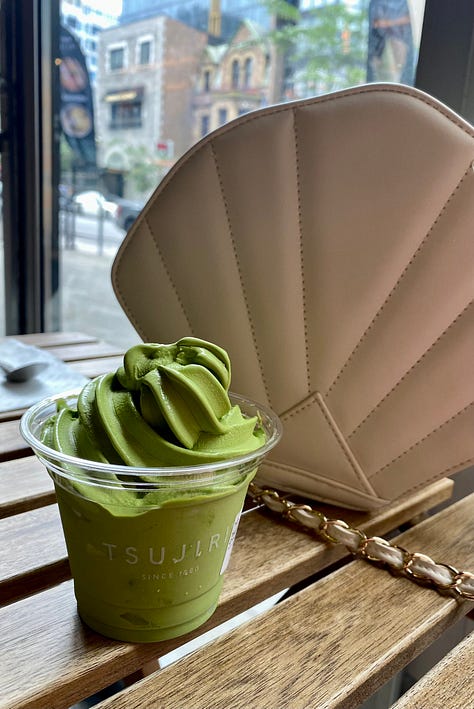
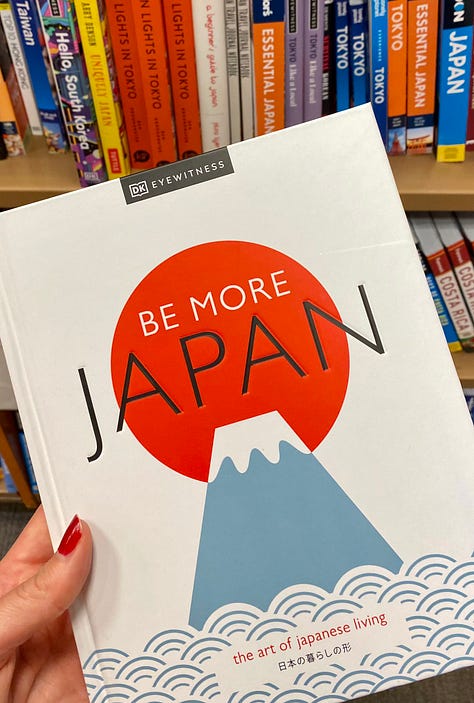
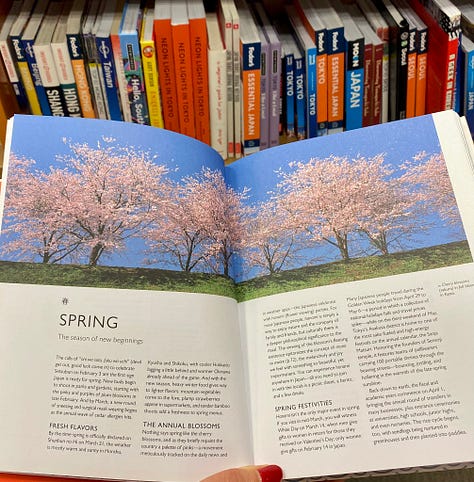
You’ll notice I often draw on stories from my adventures living in London, Sydney, and Paris and the many places I’ve travelled around them. Because many encounters I’ve had bear greater significance as I connect them to new thoughts and ideas. It’s a reminder that to write well, you have to live an interesting life. So if you find yourself unable to think of anything worth writing about, reframe your problem as an opportunity. What interesting thing could you do to spark new thoughts and ideas?
Podcast Invitation
Another reader-turned-friend is Ellen Donnelly, Founder of a coaching company called The Ask. Ellen is based in London and subscribed to my newsletter after she stumbled upon it back in February. Since then, she’s responded to a couple of editions with points of resonance concerning her journey. Through our exchanges, we realized I’d be a great candidate for her podcast spotlighting one-person businesses so we recently hopped on Zoom to record one. (Stay tuned for next week’s newsletter to check it out.)
It goes to show writing about your experiences and what you’re learning can lead to cool podcast invitations. And because you’ve been writing about the topics you’ll speak about, you’ll be less likely to fumble your words or drone on endlessly. You’ll know what your key points are and what resonates most with your target audience. Win-win.
Another benefit is promoting yourself and your business to a new audience. For example, Ellen has over 4K subscribers to her newsletter promoting her podcast—many of whom are in the UK and other parts of Europe. That’s a huge advantage for me as someone with under 1K subscribers—most of whom are based in North America.
My 1st Writing Pledge
Twenty days ago, on September 7th, I woke up to my first pledge on Substack. I’d been publishing for 98 weeks at that point. And I’d been feeling a bit bummed because I’d rushed my newsletter out the previous day to head to a friend’s pool for the afternoon. There was a heat wave in Montreal and with my lack of air conditioning, there was no way I would be able to work beyond 11 am. So I banged something out that morning, hit send, and spent a glorious day with friends.
I knew it wasn’t my best work and a record high of unsubscribers proved me right. I mostly shrugged it off—I did my best in the time I had—but a part of me was disappointed.
So imagine my sense of gratitude when I woke up the next day to this incredibly sweet message from an 80-year-old reader who pledged $80 to support my writing:
I was very touched. This gesture reminded me that every pursuit in life comes with celebrations as well as disappointments. It’s what keeps us balanced. I may have lost some subscribers who weren’t the right fit for me that week, but I gained a paid subscriber who believes in what I’m doing. That’s a net positive.
May that be an incentive to chalk up a “net positive” of your own.
Thanks for reading and have a wonder-full week,
P.S. If this post made you think or feel something, like it and comment to let me know.
⏩ If you want to help me promote my newsletter, share this one with friends.
💻 If you want to build a cohort-based course, join my Course + Community of Practice.
☕ If you want to grab coffee in Montreal, hit reply to let me know when you’re in town.




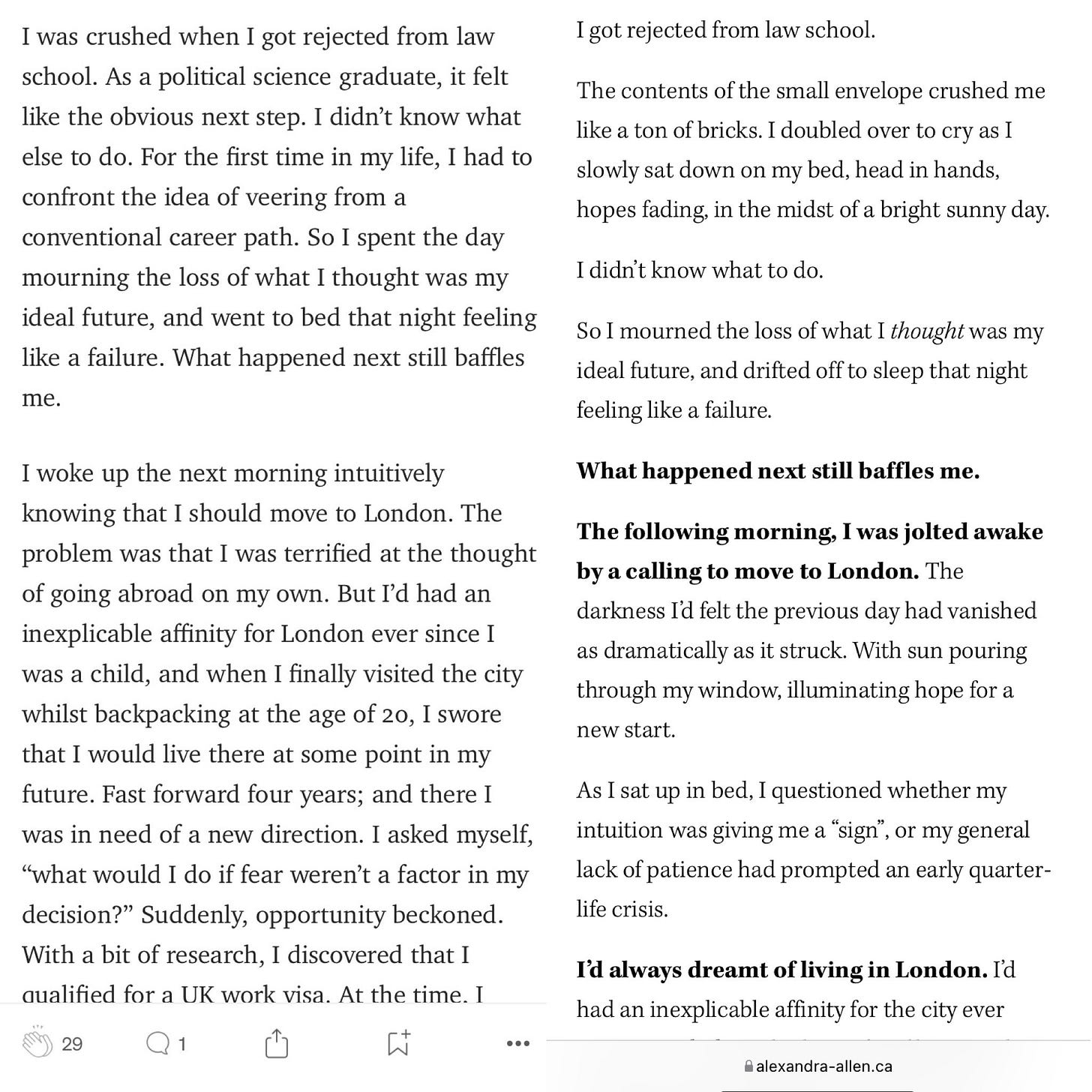
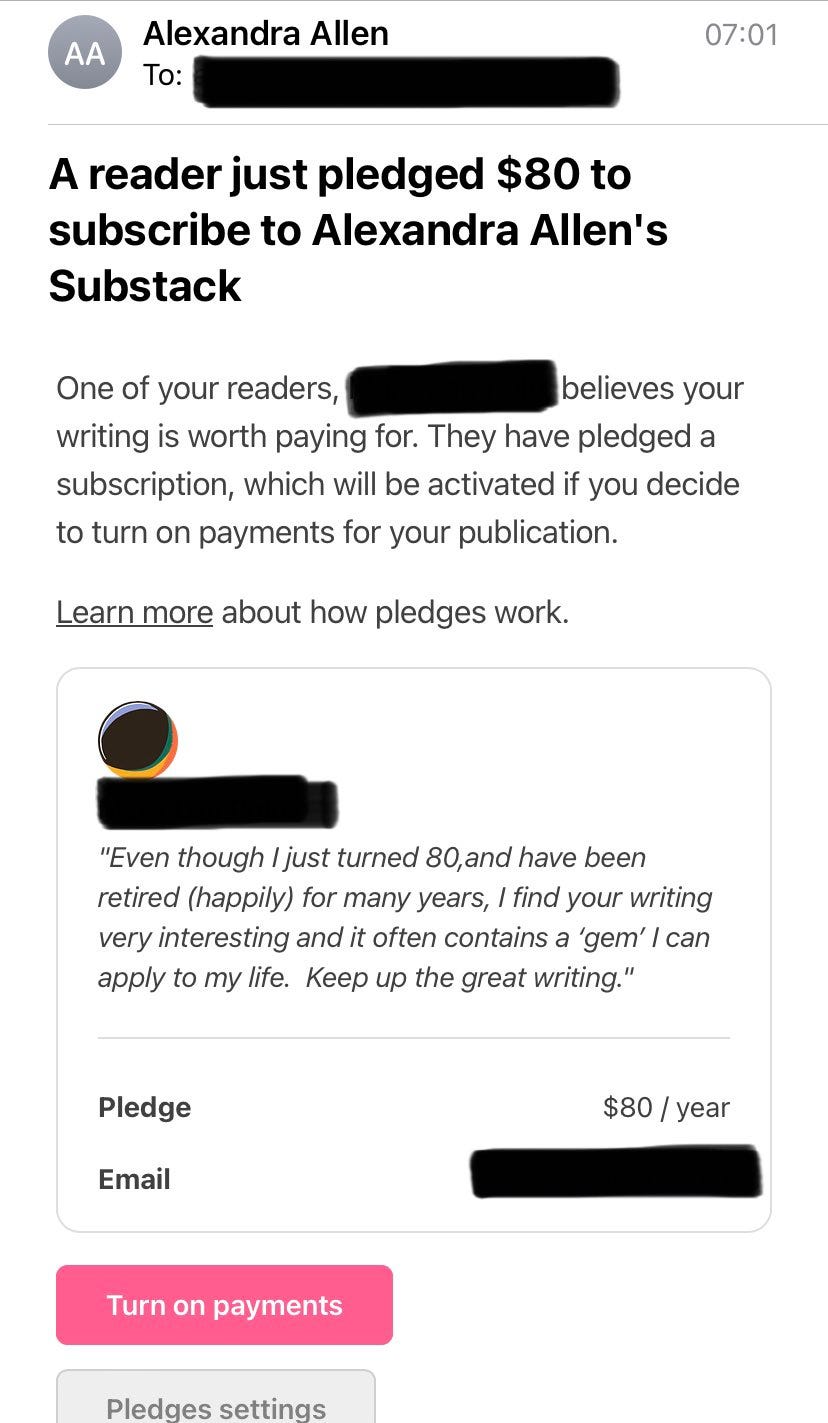
"I’d been inexplicably compelled to write about my first “professional” failure—getting rejected from law school."
I'm wondering if, in the years since that essay, you've reflected on why this was what you needed to write about. Are you able to describe what that might have been?
Almost weekly I question why I continue to publish my newsletter. It feels like a lot of work for minimal reward. And I have plenty of other things I should probably be spending my time on. You just reminded me why I do it. Thanks!